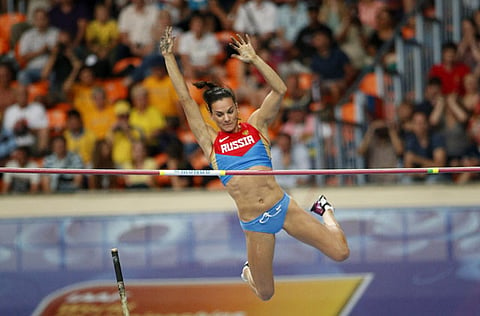Russian athletics has everything to lose from here onwards
World Athletics left with no option but to come down heavily on the country

Dubai: These are not exactly good times for any sport.
Athletics, for instance.
Someone has erred…someone has to pay.
And that’s the reality.
The Russian Athletic Federation (RusAF) was set a deadline of last Wednesday (July 1) to pay a minimum of $6.31 million (Dhs 23.16 million) as part of the reinstatement criteria after the nation’s doping scandal.
The world governing body World Athletics (WA) had fined RusAF a total of $10 million in March in lieu of expelling the suspended organisation outright.
The current ruling against Russia came about after new RusAF President Yevgeny Yurchenko accepted the failings of the previous leadership, which included seven officials - including former president Dmitry Shlyakhtin - being charged by the Athletics Integrity Unit (AIU) for obstructing an anti-doping investigation into world indoor high jump champion Danil Lysenko by forging documents to explain missed tests.
WA wanted half of the fine to be paid within July 1 along with an additional $1.31 million in various costs involved, while the remaining half of the fine had been suspended for a period of two years. Earlier this week, RusAF pleaded for an extension after claiming that it does not have the funds to pay up.
What happens next?
The first point to consider here is that the RusAF suspension has since been extended more than a dozen times.
Due to RusAF’s inability to pay off, WA has stood down its task force, which was overseeing Russia’s reinstatement, while also halting the work of the Doping Review Board (DRB) which was in the process of deciding which ‘clean’ Russian athletes can compete with neutral (ANA) status at future competitions.
While announcing the fine in March, WA had imposed an ANA cap of 10 Russian athletes for major events, including the Tokyo 2020 Olympic Games. The WA Council is scheduled to meet at the end of July next and one of the major topics will be the fate of RusAF that has been in a state of suspension since 2015.
So, simply put, the fate of Russian athletes could be mostly hinged on a decision taken at the WA Council meet on July 29-30.
One of those who believes Russian athletics is headed on a downward spiral is the country’s Anti-Doping Agency (RUSADA) director general Yury Ganus, who has gone on record to admit that there is a “high probability” WA will expel RusAF after missing out on the July 1 deadline.
Since the entire process began, former 110 metres hurdles world champion Sergey Shubenkov, reigning pole vault world champion Anzhelika Sidorova and three-time high jump world champion Mariya Lasitskene were among the eight athletes approved for ANA status.
Last month, these three wrote to Russian President Vladimir Putin asking for his intervention - failing which Russian athletics would suffer. Former two-time Olympic champion Elena Isinbayeva has also joined the movement and posted her appeal on her social media handle.
However, nothing seems to be working for the Russians so far. If one considers from the bigger perspective, then WA would be expected to take a severe decision that would not just be a precedent but could well decide a blueprint for the future of sport.
From here onwards, Russian athletics - such a formidable power in the sport - has everything to lose.



